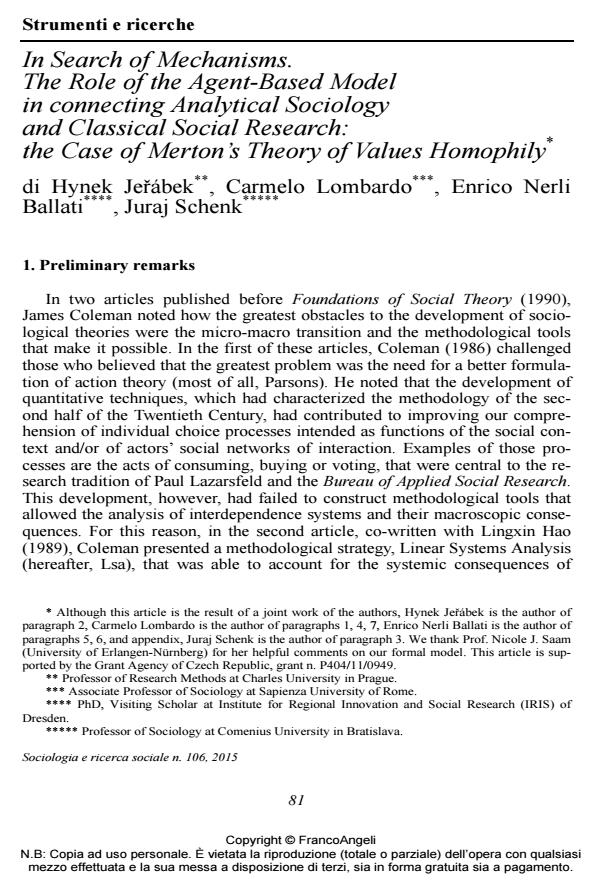In Search of Mechanisms. The Role of the Agent-Based Model in connecting Analytical Sociology and Classical Social Research: the Case of Merton’s Theory of Values Homophily
Titolo Rivista SOCIOLOGIA E RICERCA SOCIALE
Autori/Curatori Hynek Jerábek, Carmelo Lombardo, E. Neri Ballati, Juraj Schenk
Anno di pubblicazione 2015 Fascicolo 2015/106
Lingua Italiano Numero pagine 34 P. 81-114 Dimensione file 236 KB
DOI 10.3280/SR2015-106005
Il DOI è il codice a barre della proprietà intellettuale: per saperne di più
clicca qui
Qui sotto puoi vedere in anteprima la prima pagina di questo articolo.
Se questo articolo ti interessa, lo puoi acquistare (e scaricare in formato pdf) seguendo le facili indicazioni per acquistare il download credit. Acquista Download Credits per scaricare questo Articolo in formato PDF

FrancoAngeli è membro della Publishers International Linking Association, Inc (PILA), associazione indipendente e non profit per facilitare (attraverso i servizi tecnologici implementati da CrossRef.org) l’accesso degli studiosi ai contenuti digitali nelle pubblicazioni professionali e scientifiche.
Thanks Analytical Sociology, the concept of mechanism occupies a central place in contemporary sociology. Its intuitive and spontaneous use, however, characterized a part of empirical social research in the past, especially that developed by Paul F. Lazarsfeld and Robert K. Merton at Columbia University in the 1940’s and 1950’s. In this article, our aim is to explore a possible connection between these two research traditions, using the methodological tool of computational simulation. Specifically, the article discusses two hypotheses formulated by Lazarsfeld and Merton: the hypothesis of gratification, resulting from the duration of social interaction, and the hypothesis of formation of new social ties after a friendship breakup. Therefore, we implement four scenarios, each representing a specific combination of hypotheses. The results allow us to clearly observe four different emerging social patterns that are generated from the micro level by the interaction between individual agents who follow the mechanisms inspired by the original formulation of the theory. Through thes simulations, we can examine the unexpected effects - on a system of action - caused by the introduction of Lazarsfeld and Merton’s hypotheses
Hynek Jerábek, Carmelo Lombardo, E. Neri Ballati, Juraj Schenk, In Search of Mechanisms. The Role of the Agent-Based Model in connecting Analytical Sociology and Classical Social Research: the Case of Merton’s Theory of Values Homophily in "SOCIOLOGIA E RICERCA SOCIALE " 106/2015, pp 81-114, DOI: 10.3280/SR2015-106005